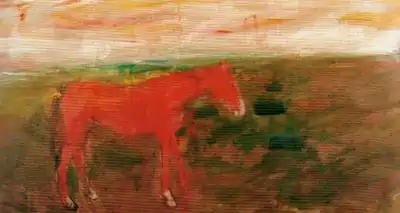Basil Blackshaw
Basil Blackshaw (1932 – 2 May 2016) was a Northern Irish artist.
Early life and education
Born in Glengormley, County Antrim, Northern Ireland and brought up in Boardmills in Lisburn, County Down,[1] Blackshaw attended Methodist College Belfast and studied at Belfast College of Art (1948–1951). In 1951 Blackshaw was awarded a scholarship to study in Paris by the Committee for the Encouragement of Music and the Arts.[2][3]
Career
His home and studio was in Co Antrim by Lough Neagh. He became well known for his country scenes including landscapes, farm buildings and horses, painted in an expressionist style.[1]
He was initially acclaimed for his mastery of traditional approaches to painting. He continued to develop as an artist, becoming most highly regarded for his very loose gestural application of paint and a very distinctive and subtle use of colour. His paintings of such sports as horse racing and boxing made him particularly popular, but Blackshaw was also a talented portrait painter.[4]

Blackshaw's paintings are often figurative in form, but with a non-naturalistic palette which re-balances the composition in an expressionist, even abstract, way. His themes are very Irish and often rural; greyhounds, Irish Travellers, and the landscape. He also produced portraits and has designed posters for Derry's Field Day Theatre Company.
The Arts Council of Northern Ireland organised a major retrospective of his work in 1995, which travelled from Belfast to Dublin, Cork and many galleries in the United States. In 2001 he received the Glen Dimplex Award for a Sustained Contribution to the Visual Arts in Ireland.[4] The Ulster Museum held a major exhibition of his work in 2002 and a major book was published by Eamonn Mallie on the artist in 2003.[2]
For a 2005 exhibition at the Fenton Gallery in Cork, Blackshaw worked exclusively over the previous 20 months creating a dramatic collection of 15 new paintings. His choice of arguably mundane subjects, The Studio Door, Car, Wall, Six Trees, express both an engagement with tradition and a watchful detachment.[2]
In 2006 Blackshaw's work was exhibited at the Centre Culturel Irlandais, Paris.[5]
Blackshaw was elected as an associate of the Royal Ulster Academy of the Arts in 1977 and elected an Academician in 1981.[3]
Works in Collections
- The Arts Council of Northern Ireland including:
- The Arts Council of Ireland including:
- The Ulster Museum
- The Hugh Lane Municipal Gallery, Dublin, including:
- Niall's Pony
- Irish Museum of Modern Art, Permanent Collection including:
- Female Nude
- Anna on a Sofa
- Windows I-IV
External links
- Brian McAvera (2002), Basil Blackshaw: A New Vision Archived 27 May 2005 at the Wayback Machine, Irish Arts Review Vol 19 No 3.
- Aosdana - Basil Blackshaw
See also
References
- "Basil Blackshaw (1932 - 2016) | Arts Council of Northern Ireland". artscouncil-ni.org. Retrieved 2019-04-02.
- "Fenton Gallery - Basil Blackshaw". Fenton Gallery review. Archived from the original on 2007-09-28. Retrieved 2007-07-22.
- "RUA Academician - Basil Blackshaw". Royal Ulster Academy of Arts. Archived from the original on 14 June 2007. Retrieved 2007-07-22.
- "Winner of Glen Dimplex Artists Award 2001 Announced". Irish Museum of Modern Art Press release. 2001-05-25. Archived from the original on 2007-09-28. Retrieved 2007-07-22.
- "Basil Blackshaw at the Centre Culturel Irlandais, Paris". Fenton Gallery review. Archived from the original on 2007-09-28. Retrieved 2007-07-22.